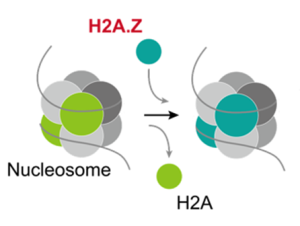Disclosure of a mechanism of the regulation of genome function: a molecular mechanism of the histone variant H2A.Z
The genome mechanism, including the expression of genes, is regulated by the structure of chromatin consisting of DNA and histones, and this regulatory system is called “epigenetics”. The deposition of histone variants into chromatin is also involved in epigenetics. An international collaboration team, including Prof. Masahiko Harata of the Laboratory of Molecular Biochemistry, found that the C-terminal structure of the histone variant H2A.Zhas important roles in epigenetics, and has published the results in the “Nature Communications” journal. H2A.Z regulates the flowering temperature of plants, and its mutations are relevant to carcinogenesis in humans. Therefore, this finding is expected to be utilized in the agricultural and medical fields.
【Publication Details】
Title: Epigenetic modulation via the C-terminal tail of H2A.Z
Authors: László Imre, Péter Nánási Jr, Ibtissem Benhamza, Kata Nóra Enyedi, Gábor Mocsár, Rosevalentine Bosire, Éva Hegedüs, Erfaneh Firouzi Niaki, Ágota Csóti, Zsuzsanna Darula, Éva Csősz, Szilárd Póliska, Beáta Scholtz, Gábor Mező, Zsolt Bacsó, H. T. Marc Timmers, Masayuki Kusakabe, Margit Balázs, György Vámosi, Juan Ausio, Peter Cheung, Katalin Tóth, David Tremethick, Masahiko Harata & Gábor Szabó
Journal: Nature Communications 15, 9171 (2024)
DOI: 10.1038/s41467-024-53514-9
URL: https://www.nature.com/articles/s41467-024-53514-9
Published: 24 October 2024
【Contact】
Name:Masahiko Harata
Affiliation: Graduate School of Agricultural Science, Tohoku University
Email:masahiko.harata.b6[at]tohoku.ac.jp



